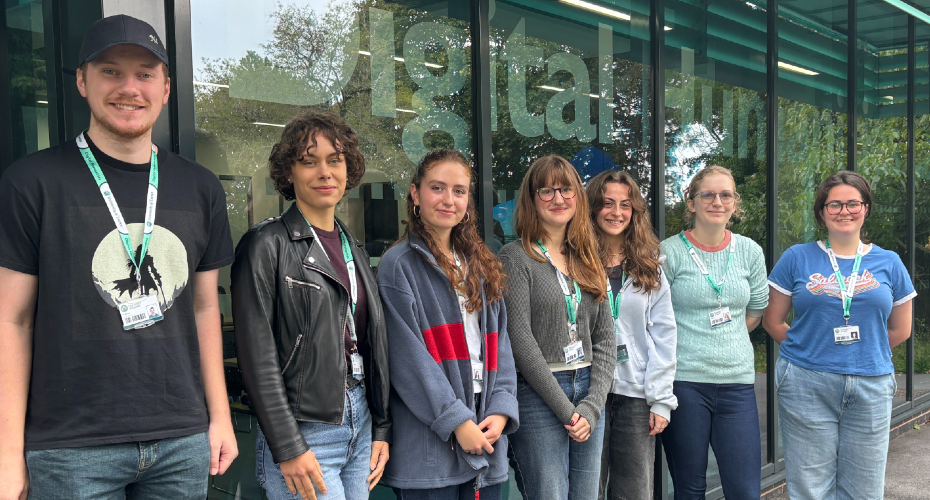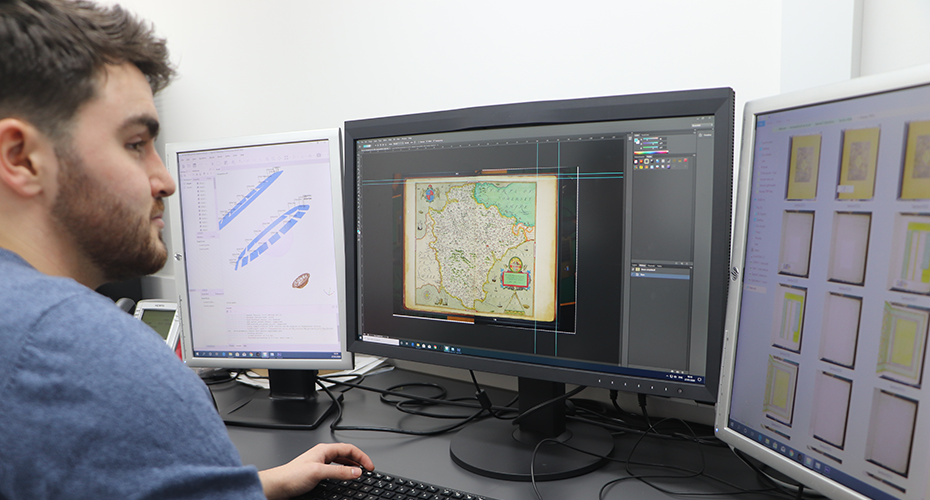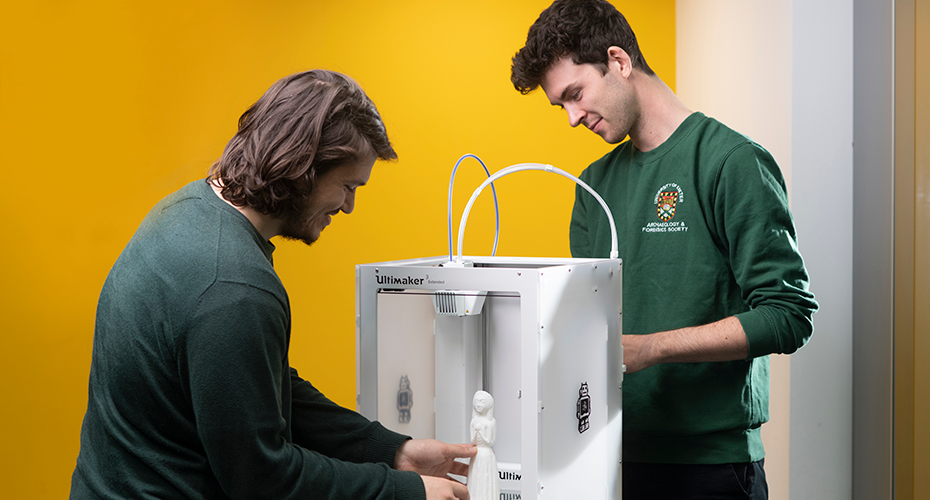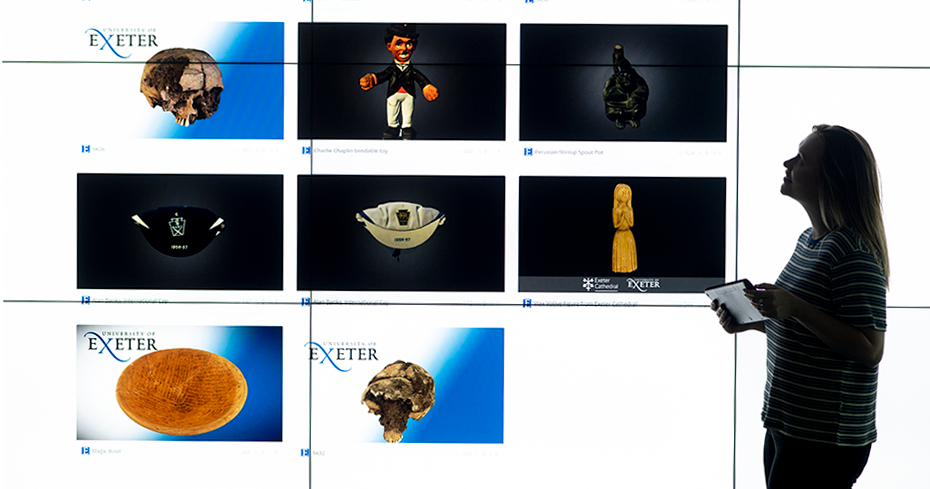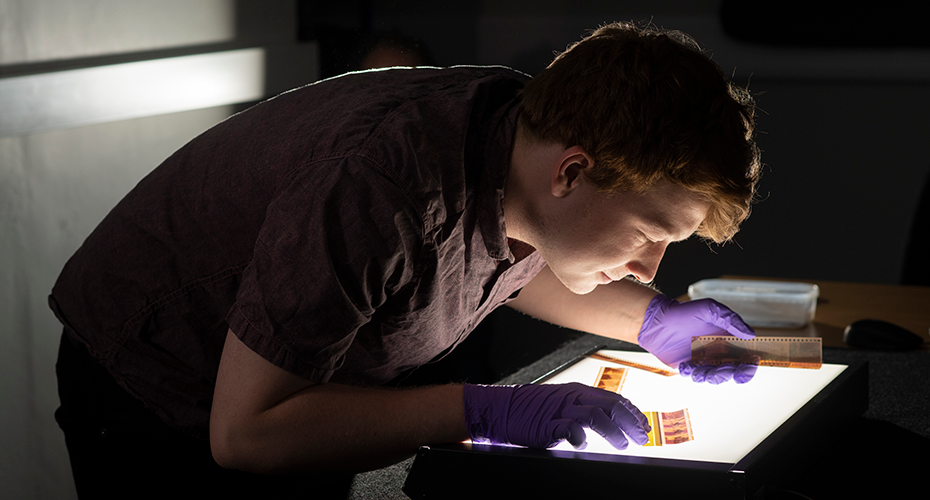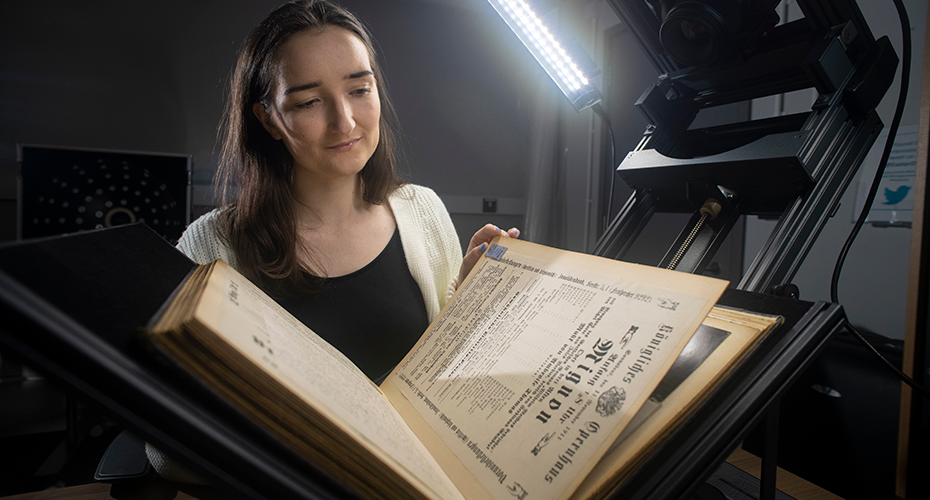Student Interns
The University of Exeter’s Digital Humanities Lab offers six paid part-time internships each academic year to undergraduate students who are studying in the faculty of Humanities, Arts and Social Sciences. Digital Humanities internships are a unique opportunity for students who are passionate about devloping their knowledge and skills using digital methods, practical skills and research to gain experience while studying.
The intern team actively contribute to current research and teaching by carrying out 2D and 3D imaging of historic collections, 3D printing and media production. They also support our staff, partners and students to engage with the Lab’s facilities and technical equipment from the advisory desk.
Intern projects
- Digitising a collection of photographic negatives for the Northcott Theatre
- Recording audio for the Lancashire Cotton Famine Poetry funded research project
- 3D scanning a collection of 20 dog skulls from the Archaeology bones collection
- Producing a digital surrogate of a panorama from the Bill Douglas Cinema Museum collections
- Supporting podcast recording and editing for research projects such as Writing Religious Conflict and Community in Exeter
You can find out more about our interns and their time in the DH Labs below:
Lucy Dennis
Hi, I’m Lucy- a second-year undergraduate history student and one of the 2024/25 interns! I found the Digital Humanities Lab during my first time visiting Exeter, whilst attending an Open Day, and was fascinated by the variety of work being carried out in the Lab. Now being able to work here, engage in research projects and develop new skills in such a welcoming environment is an amazing experience. I am constantly being provided with a growing foundation of knowledge, whether that be in the handling of materials or how to photograph old playbills. I look forward to developing these skills even further as the year progresses, such as, learning about photogrammetry and 3D printing.
I have already found the kind of work carried out by the Lab to be highly valuable to degrees such as my own, for example, being able to access sources and materials online has been very important when researching for my assessments. Therefore, the opportunity to be part of a team engaged in this digitisation work has been and continues to be an amazing opportunity!
Charlotte Lovell
Hello, I’m Charlotte, a third-year history student with a deep passion for the accessibility and quality of historical education. History has fascinated me for as long as I can remember, but my interest in how we can make historical resources more accessible took on a new significance last year when I had the opportunity to work with my university’s special collections. During this project, I focused on improving undergraduate engagement with our archives, and I quickly realised how many incredible materials were underutilised due to limited online availability. This not only hindered the research potential of students at Exeter but also anyone with a love of history.
This realisation led me to apply for the Digital Humanities internship, where I now have the exciting opportunity to learn how online accessibility is achieved. From understanding the processes, technology, and expertise involved, to contributing to the digitisation efforts, this experience has been incredibly rewarding. My favourite part so far has been the 2D digitisation process—especially seeing the level of detail revealed in documents that appear to be plain paper at first glance. It's amazing how much history is hidden in the finer details that can only be fully appreciated through digital enhancement. I’m particularly inspired by how this work can transform student engagement with history and enhance the overall learning environment.
Ellen Reynolds
Hi, I’m Ellen. I’m a 3rd year BSc Archaeology with forensic science student who is returning to the labs for a second year. I am delighted to be working on the Bill Douglas Cinema Museum collections this year as I think they will provide a new and exciting challenge for me and my skill set. I’m looking forward to being able to create images and interactive elements for visitors of the museum. I'm excited to be able to work on my digital skills and hope this year I can develop them to a graduate level.
Sam Harvey
Hi! I'm Sam, and I'm a third year History and Archaeology student. I have always had an interest in artefacts, and I have always believed that they should be more available to the everyday person, either through interactive museum exhibits, or online collections and databases. This belief was strengthened when I used an artefact database for some archaeology work, and found that while they had taken decent photos of the artefacts, it wasn't enough to allow me to fully visualise the object and obtain the knowledge I needed. I am very interested in digitisation and I have always wanted to get involved in any way I can. I was over the moon when I got this position! Already, my experience in the labs has taught me valuable information that will be helpful in the future. I'm having a lot of fun digitising post cards, playbills and letters from various collections, and I cannot wait to work with even more documents and artefacts! It's incredible to think about how our work will be used by present and future historians and archaeologists!
Charlie Stanbrook
Hi, I’m Charlie, a final year English and French student. I’ve always had a fascination with old books and antique items, so the chance of being able to delve into people’s stories further and bring ordinary people’s stories from the past alive feels extremely gratifying. I was thrilled to learn of the opportunity of becoming a digital humanities intern, after having my eyes opened to the DH world during a summer internship. Whilst working for a Canadian digital humanities research centre as an intern, I set about applying for the University of Exeter internship, eager to continue in the field and play a role in my home country and university. During my summer internship I was using TEI and XML for data visualisation and analysis and I wanted to explore further as to what the digital humanities had to offer outside of the coding aspects, particularly the earlier steps to this digitalisation process.
Having used resources provided by the work of the digital humanities in my degree I feel privileged to be able to see the work that goes on behind the scenes. Being part of the process which allows people around the world and across time to access these precious materials and heritage items feels so important. I love being able to interact with the archival materials and original artefacts as well as all the possibilities which come with digitalisation.
Working alongside other such enthusiastic interns is wonderful and I can’t wait to get stuck in with the wide variety of projects going on. Having been a keen amateur photography for years, I’m looking forward to putting my photography and photo editing skills to use in a different way. Cultural heritage is something I care deeply about, and I am excited by preservation through photography and photogrammetry, particularly when it comes to written works.
Evelyn Kenrick
Hello! I’m Evelyn, I’m a second year English undergraduate. I’ve been looking for a career path for a while that can combine my love of Computer Science with my love of English, and Digital Humanities is the perfect answer for that! I’d really like to explore how I can combine programming and digital technology with manuscript research to help us understand and make these items more accessible for the wider audience. I went to a talk last year in Exeter Cathedral on AI text recognition software that can help us transcribe complex medieval handwriting and realised this was the area I want to explore.
I’m so grateful to the DH team for allowing me to come onboard, and even though I’m not a history or an archaeology student I’m so excited to learn all about Exeter’s local history and get stuck into any projects I can! I’m really looking forward to all my future research adventures and finally combine my two, often deemed opposite interests, together.
Natasha Stratford
Hi, I’m Natasha and I am a third year Archaeological Science student. I have a strong interest in preservation and the digitalisation of artefacts to enhance accessibility for both research and public engagement, which motivated me to apply for the internship at the Digital Humanities Lab. Throughout my studies, I have encountered various techniques for analysing archaeological material, such as methods of manufacture in pottery. This internship gives me an incredible opportunity to integrate my discipline with innovative digital tools. I am eager to contribute to the team and support a variety of research projects. For instance, I have thoroughly enjoyed working on 2D photography of Theatre Royal Playbills from Special Collections within the first couple weeks! Gaining in depth training in 2D and 3D imaging, particularly looking at photogrammetry, GIS and RTI, will provide unique insights that complement my studies and equip me with valuable skills for my future career. I am very fortunate to be a part of this programme and cannot wait to see what projects I am part of this year!
Daisy Finch
Hi, I'm Daisy and I'm one of the Interns for the 2023/24 academic year! While looking for an internship to expand my professional skills ahead of pursuing a Masters, I couldn't believe my luck in finding a position that functioned as a bridge between the two sides of my degree. With a focus on Art History and Visual Culture alongside Maths, Exeter has allowed me to be really flexible in my learning and the Digital Humanities explores these subjects together in a way I hadn't heard of before but was instantly keen to explore. My experiences so far in the labs have already taught me so much and provided new motivation for my degree as I start into my final year, as well as being a welcome balance to my other academic/society work.
Before joining the DH team, I was involved with cataloguing for the Bill Douglas Cinema Museum on campus, providing me with a solid understanding of archival materials which I wanted to keep pursuing, with an added element of audio-visual experience ahead of pursuing a career in media, and Digital Humanities provided the perfect opportunity to do both. So far, I have really enjoyed working on the Northcott Theatre’s collection of Victorian playbills and I can’t wait to learn more about editing, software as well as how technology can be used to make creative resources accessible across the rest of my time as an intern!
Ellen Reynolds
Hi, I’m Ellen- I’m a second-year undergraduate studying Archaeology with Forensic science. I was introduced to the magic of digital humanities through a module I took in first year, The module introduced me to how accessible we can make artefacts, books and collections to a wider audience and not just those who are fortunate enough to have access them. It also introduced me to how much more information we can gain from seemingly unimportant documents of tabled data and how they can help tell a more intricate story.
I can’t wait to learn and develop more new skills in this internship such as 3D printing and the use of GIS technology to map out the terrains of ancient civilisations which would help my main degree invaluably and may provide a new insight into how archaeology is done in the future. The introduction of technology through photogrammetry and photography helps to preserve organic artefacts or books and it also makes them far more accessible to a wider range of people.
I am very privileged to be working with such a talented team and am really look forward to all the projects that are yet to come.
Anna Ross
Hi! I’m Anna, a fourth-year History student and I have just returned from a year’s placement working as an Academic Mentor in a secondary school and sixth-form college. After participating in the ‘Digital Humanities Festival of the Past’ a few years ago, I gained an insight into the fascinating work the DH team do and began to see how these digital techniques build the foundation for new research methods and theories.
I am looking forward to developing techniques that will increase accessibility to archival material and artefacts. This allows more people to engage with historical sources, that would otherwise be kept in archives, is incredibly important. With a career interest in museums and cultural heritage, the ability to be actively involved in creating these digitised versions of sources is very exciting. Techniques such as 2D digitisation, photogrammetry and RTI allow us to do this and reveal details of the material that may go unnoticed. The ability to work with different organisations on various projects presents opportunities to network and explore various careers with DH is also something I am really looking forward to. DH has really opened my eyes to a whole section of my discipline where I can be hands on with the technology that is at the forefront of digitising material for research. I can’t wait to get started!
Sophie Postans
Hi, I’m Sophie - a second year Chinese, Art History and Visual Culture student! I discovered the Digital Humanities Lab whilst helping in a History of Art talk on an open day as a Student Ambassador and was drawn to the variety of ways in which digital humanities can develop my understanding within my degree, especially the new applications of photographic methods as the development of photography is my favourite topic within History of Art!
When applying, I was particularly drawn to the Hardy Correspondence Project as it gave me an opportunity to learn more about my local history and I hope to be a part of similar projects during the course of my internship! I have thoroughly enjoyed using the photography equipment in the labs to digitise old theatre playbills for Special Collections and I am excited to continue working on this project and other, similar ones in the future! I am really looking forward to developing new skills through my time as a Digital Humanities Intern and I hope to carry these forward through my degree program.
Emily Chircop
Hi! I'm Emily, a second year English and Communications student. Last year, I was fortunate enough to work on the Press Play! Project in the DH Lab and co-produced a podcast engaging with sound archives from the University of British Columbia Okanagan. This introduced me to the digitisation of archival materials and the importance of digital humanities research, which sparked my interest and drew me to apply for the intern role.
Phoebe Holland
Hi! I’m Phoebe and I’m a second year History and Archaeology student. Having moved around the country a lot when I was younger, I’ve developed a real interest in local heritage as it helps me connect with a new place and as an intern at the Digital Humanities Lab I can explore the heritage of Devon in a lot more detail. I suppose you could say I’m very nosey about local history so having access to so many amazing artefacts and historical documents is an incredibly fun and rewarding experience! I’m also not particularly ‘techy’ therefore being an intern is a brilliant opportunity for me to learn as much as I can with plenty of support.
I’m very keen about making information easily accessible for everyone as well as breaking the misconception that history and heritage are boring, elitist subjects. I’m hoping that learning to digitise documents and artefacts using photogrammetry and other methods will provide me with some unique skills for the future after I graduate.
Heide Elton-Miller
Hi,I’m Heide, a third year undergraduate English student. This is my second year of being a Digitial Humanities intern, which I hope to be just as exciting and varied as my previous year. In line with my original goal of preservation and accessibility, I helped to digitise Culver House letters, cassette tape interviews with farmers, Northcott theatre archival material and more. I experienced many of the Lab’s technical areas, such as Digitisiation, Photogrammetry, RTI (Reflectance Transformation Imagery) and 3D printing, and each project came with different requirements and combinations of different skills. I hope to further my experience in the field and explore how digital resources are useful for academic and educational purposes, for those both inside and outside of educational institutions like university.
One of the most enjoyable aspects of working in Digital Humanities is seeing and experiencing new approaches to humanities that are only just emerging as possibilities.Digital humanities revolutionises academic and educational experiences, whether it be from the accessibility of primary materials (via 2D or 3D digitisation) or from assisting practical work (Artificial Intelligence programs, RTI models and 3D models of objects). I am incredibly excited to be involved in such a rapidly developing field, and am looking forward to working on more projects this year!
Stephen Finlayson
Hello, I’m Stephen- a final year History student. Having spent the third year of my degree living in Venice, I was fortunate enough to take part in a course on the digitisation of public history; we were tasked with using types of software such as GIS and GPS to develop a mobile app which would guide the user across the streets of Venice and teach them about Italian life in the 16th-century. This is where my interest in digital humanities began- utilising technology to improve our understanding of the past.
I was attracted to the Digital Humanities Lab due to the range of technologies and techniques used to preserve historical artefacts. Photogrammetry, 3D printing and 2D digitisation are just some of the digital practices that I’m looking forward to developing this year. The Digital Humanities Team have been working on some exciting projects recently- including scanning Thomas Hardy’s letters, as well as depictions of famine in early modern India- and I’m looking forward to the range of exciting upcoming projects. I am very eager to work with the team on developing accessible and interactive historical content!
Jane Marie Zelenik
Hi! I am Jane Marie a third-year Art History, Visual Culture and Classical studies student. I hope to pursue a career in museum education and I am very interested in how museums and galleries can use digital tools, such as those at the Digital Humanities Lab, to increase engagement and accessibility. A particular interest of mine is how these tools can be used to make the humanities more accessible whether through hands on experiences created through 3D printing or enhanced visual experiences as a result of photographic digitisation. Working as an intern at the Digital Humanities Lab allows me to be hands on with fascinating artifacts and to learn about areas of history that are new to me. The facilities that are most exciting to me are the audio-visual labs as an avid podcast listener, I look forward to the opportunity to work with these technologies and build upon my AV skills.
Dayna Hurst
Hi! I’m Dayna, a third year History student. Whilst participating in the DH lab’s cultural heritage festival last year, I was immediately interested in the creative ways DH has transformed learning about the past. I’m so excited to be a part of the intern team this year and already I have learnt so much about 2D digitisation and photography. One great thing about the DH team is their emphasis on learning and experimenting with the technology. In my first weeks here, I have been supported when familiarising myself with the specialist equipment and encouraged to pursue my own interests in projects. In the future I’d like to learn more about 3D modelling and photogrammetry which I think is a fascinating way of making historical collections accessible.
Fabia Shaw
Hi, I’m Fabia, I’m a fourth year english and classical studies student, and I’ve just returned from my year abroad at University College Cork, where I studied archaeology. It’s my second year in the lab, as I was an intern in 2020/1. It’s fantastic to be back, and to have the opportunity to do more things in person. The Lab is a great place to work, and right from the off you’re made to feel like a valued member of the team, and it’s a great feeling to have been able to contribute to massive projects.
Studying archaeology in Ireland, I saw how influential digital humanities and the growth of technology are in the field; from using drones to discover ancient henges, to using RTI to capture neolithic rock markings on a mountainside boulder, or to uncover unseen details of a worn and weathered high cross. My favourite area of the lab so far has been practicing 3D printing and the photography work. Photographing old film programmes from the Bill Douglas Cinema Museum was a privilege, as everything about them was fascinating - from the beautiful art deco designs, to the dated and disturbing views throughout.
Isabel Moon
Hi, my name is Isabel, I’m a third-year history student and this is my second year at the Digital Humanities Lab! Staying an intern for another year has allowed me to follow my passion for the preservation of the past and to widen my digital skills. I’ve helped on a variety of projects such as Culver House, interview with farmers, and recently digitising Bill Douglas Museum collections. Working with research fellow Dr Charlotte Tupman, I’ve learnt about OCR and have been managing digitised pages of a 19th century copy of the Valour Ecclesiasticus. My largest and most significant work has been working with the #NamibiaForAll project, designing and publishing their new website, editing and uploading interviews, and recording videos and posters for their shareholders conference. Working as part of such a large and important project has been an amazing experience and through it I’ve been able to develop numerous working skills. I’m looking forward to spending another year as an intern at the Lab!
Isabel Moon
Hi! I’m Isabel and I’m a second-year history student. I have always been passionate about preserving the lives and history of people before us as well as widening the availability of historical collections. For this reason, I am interested in growing my skills around digitisation and digital collections at the Lab. I was attracted to the lab internship because of the opportunity to advance from working with pre-digitised materials, as I had before, to having a more hands-on role within the digitisation process. In addition to this, I was inspired by the opportunity to use technology to look in more detail at historical artefacts and discover aspects about them we might never have before. I look forward to working with technology that will widen our view into the past and expand the availability of collections across both academic and public audiences.
Maya Skelton
Hi, I’m Maya – a third year studying History. After volunteering with the Lab in first year, I am incredibly excited to have been welcomed back to the DH family to learn more about the fab world of digitisation. I am fascinated by the educational potential for digital humanities; with 3D modelling and photogrammetry providing opportunities for museums and collections to become ‘hands on’ in a truly accessible way. In the future I want to work as a fashion history researcher and designer, and so the opportunity also to work with a variety of materials is immensely exciting. I am also the President of the History Society, and work with the Historical Association to deliver a range of talks and volunteer programmes, and so am excited for a potential future volunteer scheme with the Lab to promote first-year participation throughout the Humanities Department.
Jess Mountford
Hi! I’m Jess, a third year Liberal Arts student majoring in Philosophy. I’m passionate about making knowledge accessible to as many people as possible, which is what originally drew me to apply to be a Digital Humanities Intern. Having worked in the lab for a few weeks now, I feel that I’ve learnt so much more about the specific techniques and equipment involved in conservation and digitisation. Currently, I’m keen to learn more about 3D modelling and 3D printing - there is enormous potential to use these technologies to make artefacts more accessible to the public, and in terms of returning original artefacts to their country of origin and replacing them with 3D replicas. I am also excited to use the RTI equipment to analyse wax seals and embossing found on old letters. I’m sure as the year goes on I’ll find many more areas of interest, and I’m looking forward to being involved in lots of different projects!
Heide Elton-Miller
Hello, I’m Heide, a second-year undergraduate English student. My time as a DH intern so far has already been filled with exciting experiences, such as the 2D digitisation of the Culver house letters. I find personal historical objects like these letters fascinating, as they provide a unique insight into the personal life of the individual during the period.
I am really looking forward to experiencing all of the technology and skills that the Lab has to offer. I am interested in the preservation of objects, meaning I am especially looking forward to 2D digitisation and photogrammetry. I also enjoy how fragile and valuable objects, usually hidden from the public for their safety, can be freely shared and accessed through the process of digitisation. In my eyes, it creates a more personal way of consuming historical content, rather than the distant way we are accustomed to (such as in exhibitions). Techniques like TEI text encoding increase the accessibility of these objects further. The proliferation of accessible, digital, historical content is something that excites me, and I am eager to aid as a Digital Humanities Intern!
Olivia Rees
Hi, I’m Olivia, a second year English student. I’m particularly interested in creating media that is accessible to a wide audience. Whether this includes podcasts, short films, or 3D models, I love finding new ways of sparking people's interest in the humanities. Due to previous voluntary experience, I have a keen interest in Egyptology and Classics as well as literature and am looking forward to working closely with artifacts.
Laura Jones
Hi, I'm Laura- third year Archaeology and History student undertaking a Year in Industry this year. Thanks to my DH family, I am extremely lucky to have returned for a second year as a DH intern! In my first year, I really enjoyed experimenting with RTI, photogrammetry, GIS and 2D digitisation- here's me in the summer digitising material from the Northcott Theatre Archive for Special Collections. I love the range of project work and material that comes into the lab- no two days are the same! For my second year, I will explore further my specialisms from first year whilst learning more about the technical side. Great way to practise some coding! Alongside my internship I am undertaking my Year in Industry placement within the Archaeology department assisting research on material culture for the AHRC Medieval Warhorse project- Twitter handle @AHRCWarhorse. As I head closer to finishing my degree, I aim to combine my research and knowledge with my growing passion for the Digital Humanities and Archaeology. I'm looking forward to assisting with more research projects within the Lab in 2021!
Connor Spence
Hello! I’m Connor, a fourth year English with Study Abroad student. After a year out, I am over the moon to be working with the team in the lab again. In my previous stint as an intern I focussed on 2D digitisation and TEI text encoding, including working on a project with colleagues at the University of British Columbia Okanagan. This year I am looking to further my skills in other areas of Digital Humanities, including audio digitisation and Reflectance Transformation Imaging, as well as working with new projects to share our work with our community in Exeter and worldwide.
Olivia Rees
Hi, I’m Olivia, a first year English student. I’m particularly interested in creating media that is accessible to a wide audience. Whether this includes podcasts, short films, or 3D models, I love finding new ways of sparking people's interest in the humanities. Due to previous voluntary experience, I have a keen interest in Egyptology and Classics as well as literature and am looking forward to working closely with artifacts.
Clara El-Akiki
Hi! I’m Clara, a fourth year undergraduate student of Arabic and Middle Eastern Politics.
My studies focus on language and knowledge production, rethinking the dynamics that dictate who has access to knowledge as well as its production and distribution.
The Digital Humanities is such an exciting field to be working in a climate where information and education are more valuable than ever. I am passionate about supporting virtual platforms as a means to increase the accessibility of knowledge, in particular that which concerns the social sciences, humanities and the arts, for all. I am excited to be working with the Digital Humanities Lab promoting and making accessible innovative, creative and inclusive learning spaces within the University and beyond.
Courtney Priday
Hi, I’m Courtney. I’m a third year English student and most interested in text encoding and 2D digitisation. I’m looking forward to learning how to use specialist equipment in the lab and to expand my knowledge of TEI. I’m really excited about the interdisciplinary nature of digital humanities and how this can expand our understanding of literary texts.
Fabia Shaw
Hi, I’m Fabia. I’m a second year Classical Studies and English student. I’m really interested in examining physical material - the older the better! I also enjoy photography and visual editing, especially as part of my digital art, and so I’ve really loved working with the cameras in the lab. I’m most excited to learn more about 3D printing in the new term, and how printing can be used as a teaching aid.
Eve Alderson
BA History and French
I’m Eve, a fourth year History and French student. As an aspiring archivist I am particularly interested in 2D digitisation techniques which allow us to study more closely and preserve historical documents and manuscripts, as well as the use of digital archives, to make them accessible to the wider public. I am really excited to have the opportunity to get experience in using the specialist equipment in the Lab and to get involved in projects alongside the Digital Humanities team.
Francis Elsender
BA Theology
I’m Francis, a third year theology student with a great love of all emerging technologies and how they can facilitate new ways of learning about the arts and humanities. Traditional teaching methods can be limiting as people learn in a variety of different ways and as such, my interests lie in assisting with the creation of all the media resources that the lab produces. From podcasts to videos, my hope is they can inspire others to be interested in the humanities whilst showcasing the best of what the lab has to offer.
Sophie Hammond
BA History
I’m Sophie, a final year History student. I am particularly interested in 2D digitisation and preservation of historical material. I also hope to learn more about the process of 3D printing during my year as a Digital Humanities Intern. I believe that the immersive experiences achieved by 3D printing provide an incredibly innovative way for mass audiences to access the past from a fresh and unique perspective. To be at the forefront of Digital Humanities research is an exciting prospect, as is the opportunity to make documents and artefacts accessible to a diverse audience.
Laura Jones
BA History and Archaeology
Hi, I’m Laura, a second year History and Archaeology student. What attracted me to the Digital Humanities was the accessibility and preservation of heritage, its wider interdisciplinary approach and how its application shapes creativity and innovation. Specifically, I am interested in how the Digital Humanities are used for landscapes such as townscapes and structural features within them in archaeology through the use of 3D techniques, GIS and LiDAR. I also wish to explore how photogrammetry and RTI can be used to provide extra visualisation and interpretation of artefacts.
Jordan Lloyd-Head
BA History
I’m Jordan, a second year History student. I am interested in Digital Humanities primarily because of its collaborative and creative nature, involving multiple skills types, disciplines and people which provide new ways of thinking about the past. I am particularly fascinated by 2D digitisation and archival photography as a new way of engaging with historical artefacts and texts and look forward to developing these skills further this year.
Tumisang Mbedzi
BSc Archaeology with Forensic Science
I am a 3rd year Archaeology and Forensic Science student with a keen interest in 3D printing techniques and photogrammetry I have high anticipation the experience will contribute to answering some of the questions I have with emphasis on 3D manipulation and structure building to represent ancient hominin species. This will be a great opportunity to learn and expand my horizons in the field with an increasing versatility.
Ciprian Lungescu
BA Archaeology
Connor Spence
BA English
Corey Hamilton
BA English
Dan Brock
BA Ancient History and Archaeology
Eleanor Mason
BA Classics and Ancient History
Ollie Anthony
BA Archaeology and Anthropology
Daniel Wakefield
BA English
Emily Earp
BA English
Hannah Britton
BA Archaeology
Hannah Houghton
BA English
Eleanor Mason
BA Classics and Ancient History
Keziah Pugh
BA History and Spanish
Interested?
Check out the University of Exeter's Career Zone for upcoming internship posts. For any queries please email digitalhumanities[at]exeter.ac.uk.
Follow the activities of the Digital Humanities team and interns on our social media channels.

